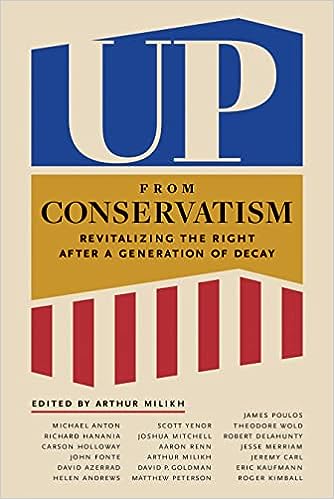Economics
The Revanchist Right
… despite spending billions of dollars supporting its infrastructure, and publishing untold thousands of white papers, the establishment Right has registered…


- … despite spending billions of dollars supporting its infrastructure, and publishing untold thousands of white papers, the establishment Right has registered no clear gains and many clear losses. Much of the nation was conquered on its watch.
- … In terms of political and moral power, the Left currently rules every consequential sector of society, from the nation’s educational institutions (K-12 and higher education), to large parts of the media, corporate America, Big Tech, and the federal administrative apparatus.
- ——Arthur Milikh, ed., Up from Conservatism1 “Introduction” (p. viii).
Milikh argues that while conservatives were busy on the economic front defending free markets, America’s cultural and legal regime was invaded and conquered by the Left.
- One cannot defend civilization, or do what is necessary to preserve it, when consumption and private frivolity are the goals…. The Right seems to have forgotten that a nation can easily combine, in the short term at least, both prosperity and moral degeneracy which undermines self-rule. (Milikh, p. ix)
He sees mainstream conservatism as having made too many concessions to the Left. He rejects a politics of give-and-take, arguing that this has meant too much give and not enough take.
- The New Right has abandoned the soothing illusion that, despite a few hiccups, things are essentially normal and stable in America, and that we can go on down the present trajectory in collegial give-and-take with the Left. Our crisis demands a bolder and sometimes more confrontational approach…. The leftist revolution in America has already taken place. As counterrevolutionaries, the New Right must have a strategy for creating and retaking space for its constituents, breaking and replacing captured institutions, and liberating them from the moral horizons of the Left. (Milikh, p. xi)
Milikh and other contributors offer bold suggestions for rolling back the progressive tide once conservatives obtain political hegemony. They have much less to say about how to achieve this ascendancy. One will not find here a plan for locating the political center or constructing a coalition.
Richard Hanania writes,
- Conservatives should put their energies into fighting to take over—or, in some cases, denigrating and destroying—those institutions that are most important and most influenced by leftist politics. (Hanania, p. 20)
For example,
- The federal government forces private institutions to classify individuals according to race and sex, to prefer protected groups, that is non-whites and women, over others, and even to regulate social life. There are a handful of government agencies that are most responsible for enforcing compliance… Congress needs to defund them, or at the very least tie their hands by specifying that discrimination means intentional discrimination, not disparate impact (Hanania, p. 22)
Hanania argues that conservative complaints,
- … can only be fixed by doing the unglamorous work of building the kinds of institutions that hold politicians accountable on the issues they care about. In certain areas—guns, abortion, taxes—conservatives have already done this and so have created litmus tests for Republican politicians hoping to advance their careers. It is the job of activists to make sure civil rights law, school choice, defunding university bureaucracies, and giving the president greater control over the federal workforce are added to this list. (Hanania, p. 30)
He says that conservatives have a new clarity of focus on progressive power centers. For example, they recognize the need to target teachers’ unions, who favored school shutdowns during the pandemic and want to promulgate controversial ideas on race and gender in the classroom.
Helen Andrews argues that establishment conservatives have passively watched as education in “family planning” has focused on how to prevent pregnancy, without informing women of the biological challenges of waiting until they are thirties to start having children. Conservatives should recommend that women put family ahead of career.
- If you put family first, you can end up doing both. If you set out trying to do both, you are quite likely to end up with just the career. (Andrews, p. 72)
Heedless of that, young adults today are increasingly unmarried and childless.
- Projections have it that 25 percent of millennials will be childless—one in four. By comparison, for baby boomers it’s closer to one in nine…. If you want to look at how married a generation is, you look at age 21 to 36. In 1965, 17 percent of that age block had never been married. In 2017, it was 57 percent (Andrews, p. 72)
Scott Yenor laments that
- The conservative movement’s broad trajectory on family is one of loss after loss: feminism, followed by the gay revolution, followed by same-sex marriage, and followed soon (perhaps) by trans rights. (Yenor, p. 80)
One can say that the various sexual liberation movements asked for more than “love the sinner, hate the sin.” They demand that everyone love the sin.
Yenor argues that
- Society must honor man-woman, marital procreative sex over other expressions of sexual mingling if it wants to survive and thrive over the long haul. (Yenor, p. 87)
The Revanchist Right (my term, not theirs) employs pugnacious rhetoric. For example, in a chapter on education, Milikh and Yenor write,
- The New Right must endorse government and private actions to harm, humiliate, and destroy our education establishment and rebuild a competitive, patriotic, moral educational model suitable for a great country. (Milikh and Yenor, p. 108-109)
As a specific suggestion, they offer
- Red states could break up universities between “hard sciences” and “pretend sciences,” funding only the hard sciences with public monies, while allowing the others to compete or wither away on the vine. (Milikh and Yenor, p. 118)
The contributors to this volume are ready to do away with free trade and laissez faire. David P. Goldman writes that libertarian economic policies,
- … unleashed two related monsters that ate American business: the establishment of monopolies, and the destruction of our industrial base, which led to vast trade deficits based on consumer pathology. (Goldman, p. 128)
Later, he writes,
- … we need selective subsidies for mission-critical industries, including semiconductors, advanced materials, quantum computing, quantum communications, high-speed broadband, and other technologies (Goldman, p. 136)
Theodore Wold reviews the history of the administrative state. He points out that it was justified initially as a way to achieve government coordination in the context of an increasingly complex society. But,
- What began as a type of separation-of-powers “innovation” beyond the Constitution has persisted as nothing less than tyranny. The vast majority of our governance today is created, maintained, and enforced by unelected bureaucrats who are almost entirely insulated from accountability to any branch of government, let alone the people. (Wold, p. 168)
Wold does not see reform or incremental deregulation as the answer. He asserts that,
- … rule by experts and technocrats is not the self-evident and necessary solution to the problem of modernity…
- The only prescription for the administrative state is deconstruction. Dismantling. (Wold, p.179)
Robert Delahunty advocates reining in the FBI and other parts of the intelligence apparatus. In proposing legislation to curtail the use of surveillance against citizens, he writes,
- Such legislation would likely be supported by civil libertarians on the Left (Delahunty, p. 198)
His is the only contribution that mentions the possibility of a coalition.
More typical is Jesse Merriam, who cannot even stomach praise for the conservative judicial movement.
- Nearly all scholars, on the Left and Right alike, treat the legal branch of the conservative movement—the “legal conservative movement” (LCM)—as triumphant. In one scholar’s words, the LCM has mounted a “conservative counterrevolution” against the liberal establishment. But this account is wrong. The LCM has failed to achieve its original goal of restoring the pre-1960s constitutional order (Merriam, p. 227)
Subsequent to the book’s publication, the Supreme Court ruled against Harvard’s race-based admissions policies. In my view, this represents a genuine triumph for the legal conservative movement. I believe that this ruling could prove as culturally significant as Brown vs. Board of Education, for the same reason. That is, the American people were fed up with racial segregation in 1954, and they are fed up with affirmative action today. Nevertheless, it took a court decision to shock the system.
The Revanchists seem to have no desire for allies. For example, Michael Anton writes,
- Many of the most powerful people in our country—CEOs, high government officials, prestige professors—were born elsewhere. This is one of those things one is allowed to notice only if one approves. (Anton, p. 11)
Evidently, he does not approve of these immigrant success stories. He cares about their country of origin, not the content of their character.
Concerning the phrase “A Nation of Immigrants,” which was used by then Senator John F. Kennedy for a book title, Jeremy Carl writes,
- The first outlined draft was written by a historian hired by the Anti-Defamation League, the premier Jewish NGO in America. That outline was turned into a book by Kennedy staffer Myer Feldman (whose Jewish parents had arrived from Ukraine three years before his birth). The law itself [Hart-Cellar Act, 1965] was passed in no small part owing to heavy lobbying from Catholics and Jews, whom Kennedy (a Catholic) had been targeting in his campaign. Many Jews, stung by the many instances of oppression experienced in ethnically unified countries in Europe in which most had formerly resided, were eager not to have an ethnically unified America in which the majority might discriminate against them. (Carl, p. 247)
That is quite an accusation to hurl against Jews. That the whole reason they supported immigration reform was to keep the United States from being an ethnically unified country.
For more on these topics, see
The contributors to this volume could have been content to make their case for using political power to address institutions in education, government agencies, and the broader culture that are captive to extreme progressive ideology. Instead, they also aim their fire at people with other conservative persuasions and other ethnic backgrounds.
They see themselves as surrounded by adversaries. And they are correct.
Footnotes
[1] Arthur Milikh (ed.), Up from Conservatism: Revitalizing the Right after a Generation of Decay. Encounter Books, 2023.
*Arnold Kling has a Ph.D. in economics from the Massachusetts Institute of Technology. He is the author of several books, including Crisis of Abundance: Rethinking How We Pay for Health Care; Invisible Wealth: The Hidden Story of How Markets Work; Unchecked and Unbalanced: How the Discrepancy Between Knowledge and Power Caused the Financial Crisis and Threatens Democracy; and Specialization and Trade: A Re-introduction to Economics. He contributed to EconLog from January 2003 through August 2012.
Read more of what Arnold Kling’s been reading. For more book reviews and articles by Arnold Kling, see the Archive.
As an Amazon Associate, Econlib earns from qualifying purchases.
(0 COMMENTS)
markets
fed
libertarian

Argentina Is One of the Most Regulated Countries in the World
In the coming days and weeks, we can expect further, far‐reaching reform proposals that will go through the Argentine congress.
Crypto, Crude, & Crap Stocks Rally As Yield Curve Steepens, Rate-Cut Hopes Soar
Crypto, Crude, & Crap Stocks Rally As Yield Curve Steepens, Rate-Cut Hopes Soar
A weird week of macro data – strong jobless claims but…
Fed Pivot: A Blend of Confidence and Folly
Fed Pivot: Charting a New Course in Economic Strategy Dec 22, 2023 Introduction In the dynamic world of economics, the Federal Reserve, the central bank…















